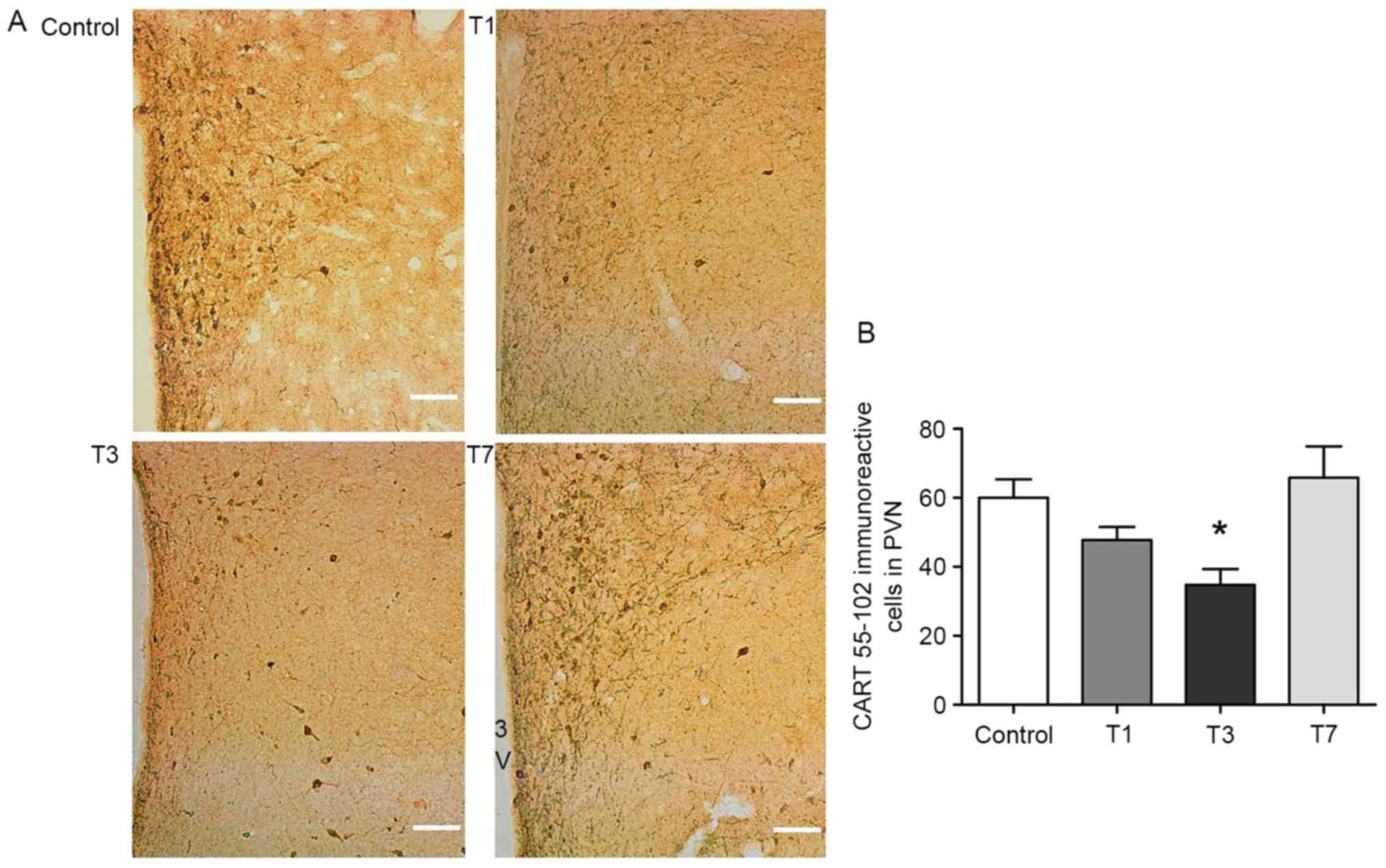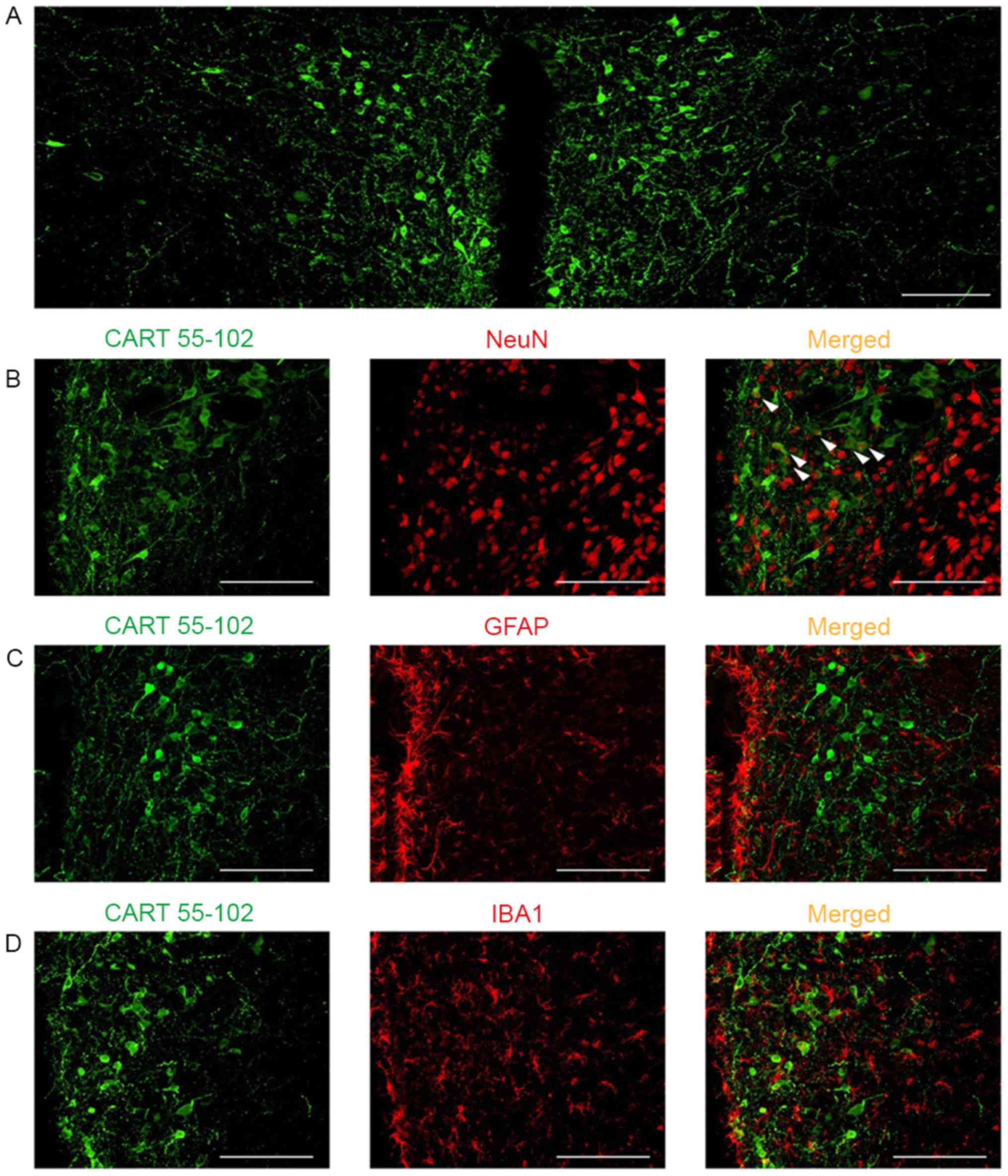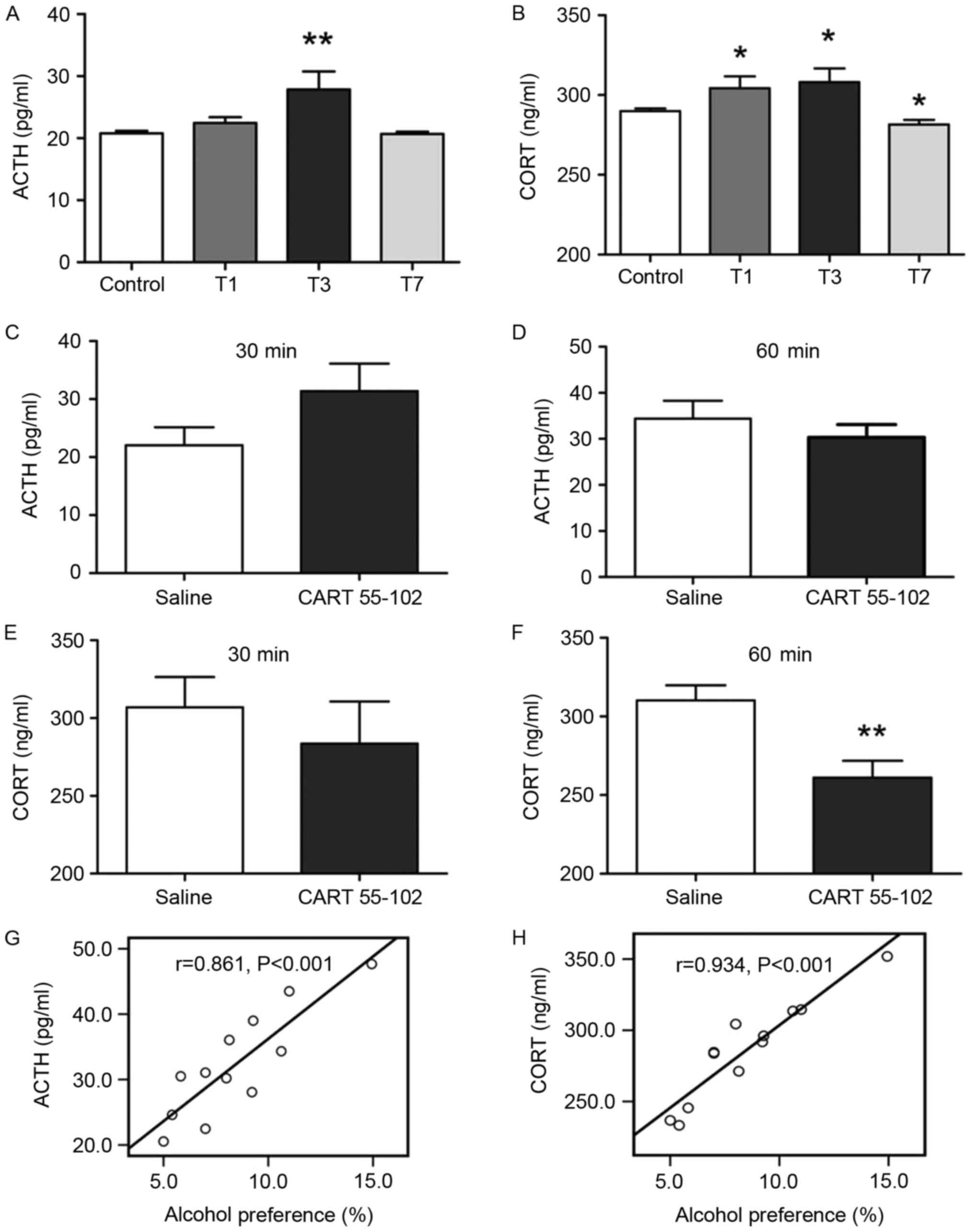|
1
|
Koob GF, Ahmed SH, Boutrel B, Chen SA,
Kenny PJ, Markou A, O'Dell LE, Parsons LH and Sanna PP:
Neurobiological mechanisms in the transition from drug use to drug
dependence. Neurosci Biobehav Rev. 27:739–749. 2004. View Article : Google Scholar : PubMed/NCBI
|
|
2
|
Koob G and Kreek MJ: Stress, dysregulation
of drug reward pathways, and the transition to drug dependence. Am
J Psychiat. 164:1149–1159. 2007. View Article : Google Scholar : PubMed/NCBI
|
|
3
|
Federico A, Cotticelli G, Festi D,
Schiumerini R, Addolorato G, Ferrulli A, Merli M, Lucidi C, Milani
S, Panella C, et al: The effects of alcohol on gastrointestinal
tract, liver and pancreas: Evidence-based suggestions for clinical
management. Eur Rev Med Pharmacol Sci. 19:1922–1940.
2015.PubMed/NCBI
|
|
4
|
Sun C, Shen L, Li X, Liu C and Zhou Y:
Risk of pneumonia in central nervous system injury with alcohol
intake: A meta-analysis. Int J Clin Exp Med. 8:15738–15744.
2015.PubMed/NCBI
|
|
5
|
Becker HC, Lopez MF and Doremus-Fitzwater
TL: Effects of stress on alcohol drinking: A review of animal
studies. Psychopharmacology (Berl). 218:131–156. 2011. View Article : Google Scholar : PubMed/NCBI
|
|
6
|
Anthenelli R and Grandison L: Effects of
stress on alcohol consumption. Alcohol Res Current Rev. 34:381–382.
2012.
|
|
7
|
Ursano RJ, Zhang L, Li H, Johnson L,
Carlton J, Fullerton CS and Benedek DM: PTSD and traumatic stress.
Brain Res. 1293:2–12. 2009. View Article : Google Scholar : PubMed/NCBI
|
|
8
|
Xiao S, Wang J, Jiang J, Cao X, Wu G and
Zhao H: Characterization of Fyn signaling on the age-dependent
immuno-modulation on traumatic rats. Brain Res. 1255:162–169. 2009.
View Article : Google Scholar : PubMed/NCBI
|
|
9
|
Blednov YA, Benavidez JM, Geil C, Perra S,
Morikawa H and Harris RA: Activation of inflammatory signaling by
lipopolysaccharide produces a prolonged increase of voluntary
alcohol intake in mice. Brain Behav Immun. 25 Suppl 1:S92–S105.
2011. View Article : Google Scholar : PubMed/NCBI
|
|
10
|
Blednov YA, Ponomarev I, Geil C, Bergeson
S, Koob GF and Harris RA: Neuroimmune regulation of alcohol
consumption: Behavioral validation of genes obtained from genomic
studies. Addict Biol. 17:108–120. 2012. View Article : Google Scholar : PubMed/NCBI
|
|
11
|
Douglass J, Mckinzie AA and Couceyro P:
PCR differential display identifies a rat brain mRNA that is
transcriptionally regulated by cocaine and amphetamine. J Neurosci.
15:2471–2481. 1995.PubMed/NCBI
|
|
12
|
Koylu EO, Couceyro PR, Lambert PD, Ling
NC, DeSouza EB and Kuhar MJ: Immunohistochemical localization of
novel CART peptides in rat hypothalamus, pituitary and adrenal
gland. J Neuroendocrinol. 9:823–833. 1997. View Article : Google Scholar : PubMed/NCBI
|
|
13
|
Kristensen P, Judge ME, Thim L, Ribel U,
Christjansen KN, Wulff BS, Clausen JT, Jensen PB, Madsen OD, Vrang
N, et al: Hypothalamic CART is a new anorectic peptide regulated by
leptin. Nature. 393:72–76. 1998. View
Article : Google Scholar : PubMed/NCBI
|
|
14
|
Rogge G, Jones D, Hubert GW, Lin Y and
Kuhar MJ: CART peptides: Regulators of body weight, reward and
other functions. Nat Rev Neurosci. 9:747–758. 2008. View Article : Google Scholar : PubMed/NCBI
|
|
15
|
Kuhar MJ and Yoho LL: CART peptide
analysis by Western blotting. Synapse. 33:163–171. 1999. View Article : Google Scholar : PubMed/NCBI
|
|
16
|
Koylu EO, Balkan B, Kuhar MJ and Pogun S:
Cocaine and amphetamine regulated transcript (CART) and the stress
response. Peptides. 27:1956–1969. 2006. View Article : Google Scholar : PubMed/NCBI
|
|
17
|
Sharma A, Rale A, Utturwar K, Ghose A and
Subhedar N: Identification of the CART neuropeptide circuitry
processing TMT-induced predator stress. Psychoneuroendocrino.
50:194–208. 2014. View Article : Google Scholar
|
|
18
|
Bakhtazad A, Vousooghi N, Garmabi B and
Zarrindast MR: Evaluation of CART peptide level in rat plasma and
CSF: Possible role as a biomarker in opioid addiction. Peptides.
84:1–6. 2016. View Article : Google Scholar : PubMed/NCBI
|
|
19
|
Jaworski JN, Vicentic A, Hunter RG, Kimmel
HL and Kuhar MJ: CART peptides are modulators of mesolimbic
dopamine and psychostimulants. Life Sci. 73:741–747. 2003.
View Article : Google Scholar : PubMed/NCBI
|
|
20
|
Millan EZ and McNally GP: Cocaine- and
amphetamine-regulated transcript in the nucleus accumbens shell
attenuates context-induced reinstatement of alcohol seeking. Behav
Neurosci. 126:690–698. 2012. View
Article : Google Scholar : PubMed/NCBI
|
|
21
|
Herman JP, Figueiredo H, Mueller NK,
Ulrich-Lai Y, Ostrander MM, Choi DC and Cullinan WE: Central
mechanisms of stress integration: Hierarchical circuitry
controlling hypothalamo-pituitary-adrenocortical responsiveness.
Front Neuroendocrinol. 24:151–180. 2003. View Article : Google Scholar : PubMed/NCBI
|
|
22
|
Linthorst ACE and Reul JM: Stress and the
brain: Solving the puzzle using microdialysis. Pharmacol Biochem
Behav. 90:163–173. 2008. View Article : Google Scholar : PubMed/NCBI
|
|
23
|
Stanley SA, Small CJ, Murphy KG, Rayes E,
Abbott CR, Seal LJ, Morgan DG, Sunter D, Dakin CL, Kim MS, et al:
Actions of cocaine- and amphetamine-regulated transcript (CART)
peptide on regulation of appetite and hypothalamo-pituitary axes in
vitro and in vivo in male rats. Brain Res. 893:186–194. 2001.
View Article : Google Scholar : PubMed/NCBI
|
|
24
|
Mou Huilin XZXL: NRSF and CCR5 established
neuron-glia communication during acute and chronic stresses. Drug
Metabol Toxicol. 5:2016.
|
|
25
|
Janet C and Garber RWBJ: Guide for the
care and use of lab animals. Washington, DC: National Academy
Press; 2010
|
|
26
|
Zhao H, Huang HW, Wu GC and Cao XD: Effect
of orphanin FQ on interleukin-1beta mRNA transcripts in the rat
CNS. Neuroscience. 114:1019–1031. 2002. View Article : Google Scholar : PubMed/NCBI
|
|
27
|
Beckwith SW and Czachowski CL:
Alcohol-preferring P rats exhibit elevated motor impulsivity
concomitant with operant responding and self-administration of
alcohol. Alcohol Clin Exp Res. 40:1100–1110. 2016. View Article : Google Scholar : PubMed/NCBI
|
|
28
|
Feng XM, Mi WL, Xia F, Mao-Ying QL, Jiang
JW, Xiao S, Wang ZF, Wang YQ and Wu GC: Involvement of spinal
orexin A in the electroacupuncture analgesia in a rat model of
post-laparotomy pain. BMC Complement Altern Med. 12:2252012.
View Article : Google Scholar : PubMed/NCBI
|
|
29
|
Dimopoulou I, Tzanela M, Vassiliadi D,
Mavrou I, Kopterides P, Orfanos S, Kotanidou A, Kontogiannopoulou
S, Vasdekis S, et al: Pituitary-adrenal responses following major
abdominal surgery. Hormones (Athens). 7:237–242. 2008. View Article : Google Scholar : PubMed/NCBI
|
|
30
|
Smith SM, Vaughan JM, Donaldson CJ, Rivier
J, Li C, Chen A and Vale WW: Cocaine- and amphetamine-regulated
transcript activates the hypothalamic-pituitary-adrenal axis
through a corticotropin-releasing factor receptor-dependent
mechanism. Endocrinology. 145:5202–5209. 2004. View Article : Google Scholar : PubMed/NCBI
|
|
31
|
Marco EM, Ballesta JA, Irala C, Hernández
MD, Serrano ME, Mela V, López-Gallardo M and Viveros MP:
Sex-dependent influence of chronic mild stress (CMS) on voluntary
alcohol consumption; study of neurobiological consequences.
Pharmacol Biochem Behav. 152:68–80. 2017. View Article : Google Scholar : PubMed/NCBI
|
|
32
|
Weil ZM, Karelina K, Gaier KR, Corrigan TE
and Corrigan JD: Juvenile traumatic brain injury increases alcohol
consumption and reward in female mice. J Neurotraum. 33:895–903.
2016. View Article : Google Scholar
|
|
33
|
Ostroumov A, Thomas AM, Kimmey BA, Karsch
JS, Doyon WM and Dani JA: Stress increases ethanol
self-administration via a shift toward excitatory gaba signaling in
the ventral tegmental area. Neuron. 92:493–504. 2016. View Article : Google Scholar : PubMed/NCBI
|
|
34
|
Adams RS, Larson MJ, Corrigan JD, Ritter
GA and Williams TV: Traumatic brain injury among U.S. active duty
military personnel and negative drinking-related consequences.
Subst Use Misuse. 48:821–836. 2013. View Article : Google Scholar : PubMed/NCBI
|
|
35
|
Koob GF and Le Moal M: Drug addiction,
dysregulation of reward, and allostasis. Neuropsychopharmacol.
24:97–129. 2001. View Article : Google Scholar
|
|
36
|
Wan Y, Xu J, Meng F, Bao Y, Ge Y, Lobo N,
Vizcaychipi MP, Zhang D, Gentleman SM, Maze M and Ma D: Cognitive
decline following major surgery is associated with gliosis,
β-amyloid accumulation, and τ phosphorylation in old mice. Crit
Care Med. 38:2190–2198. 2010. View Article : Google Scholar : PubMed/NCBI
|
|
37
|
Sperling RE, Gomes SM, Sypek EI, Carey AN
and McLaughlin JP: Endogenous kappa-opioid mediation of
stress-induced potentiation of ethanol-conditioned place preference
and self-administration. Psychopharmacology (Berl). 210:199–209.
2010. View Article : Google Scholar : PubMed/NCBI
|
|
38
|
King BJ, Furlong TM and McNally GP:
Cocaine and amphetamine related transcript (CART) inhibits context
induced reinstatement of reward seeking. Behav Neurosci.
124:423–427. 2010. View
Article : Google Scholar : PubMed/NCBI
|
|
39
|
Kimmel HL, Gong W, Vechia SD, Hunter RG
and Kuhar MJ: Intra-ventral tegmental area injection of rat cocaine
and amphetamine-regulated transcript peptide 55–102 induces
locomotor activity and promotes conditioned place preference. J
Pharmacol Exp Ther. 294:784–792. 2000.PubMed/NCBI
|
|
40
|
Cook CJ: Stress induces CRF release in the
paraventricular nucleus, and both CRF and GABA release in the
amygdala. Physiol Behav. 82:751–762. 2004. View Article : Google Scholar : PubMed/NCBI
|
|
41
|
Dandekar MP, Singru PS, Kokare DM and
Subhedar NK: Transient up-regulation of cocaine- and
amphetamine-regulated transcript peptide (CART) immunoreactivity
following ethanol withdrawal in rat hypothalamus. Brain Res.
1240:119–131. 2008. View Article : Google Scholar : PubMed/NCBI
|
|
42
|
Chen YW, Barson JR, Chen A, Hoebel BG and
Leibowitz SF: Hypothalamic peptides controlling alcohol intake:
Differential effects on microstructure of drinking bouts. Alcohol.
48:657–664. 2014. View Article : Google Scholar : PubMed/NCBI
|
|
43
|
Balkan B, Gozen O, Yararbas G, Koylu EO,
Akinturk S, Kuhar MJ and Pogun S: CART expression in limbic regions
of rat brain following forced swim stress: Sex differences.
Neuropeptides. 40:185–193. 2006. View Article : Google Scholar : PubMed/NCBI
|
|
44
|
Stanley SA, Murphy KG, Bewick GA, Kong WM,
Opacka-Juffry J, Gardiner JV, Ghatei M, Small CJ and Bloom SR:
Regulation of rat pituitary cocaine- and amphetamine-regulated
transcript (CART) by CRH and glucocorticoids. Am J Physiol
Endocrinol Metab. 287:E583–E590. 2004. View Article : Google Scholar : PubMed/NCBI
|
|
45
|
Galesi FL, Ayanwuyi LO, Mijares MG,
Cippitelli A, Cannella N, Ciccocioppo R and Ubaldi M: Role of
Hypothalamic-Pituitary-Adrenal axis and corticotropin-releasing
factor stress system on cue-induced relapse to alcohol seeking. Eur
J Pharmacol. 788:84–89. 2016. View Article : Google Scholar : PubMed/NCBI
|
|
46
|
Fahlke C, Hård E, Eriksson CJ, Engel JA
and Hansen S: Consequence of long-term exposure to corticosterone
or dexamethasone on ethanol consumption in the adrenalectomized
rat, and the effect of type I and type II corticosteroid receptor
antagonists. Psychopharmacology (Berl). 117:216–224. 1995.
View Article : Google Scholar : PubMed/NCBI
|
|
47
|
Deroche V, Marinelli M, Le Moal M and
Piazza PV: Glucocorticoids and behavioral effects of
psychostimulants. II: cocaine intravenous self-administration and
reinstatement depend on glucocorticoid levels. J Pharmacol Exp
Ther. 281:1401–1407. 1997.PubMed/NCBI
|



















